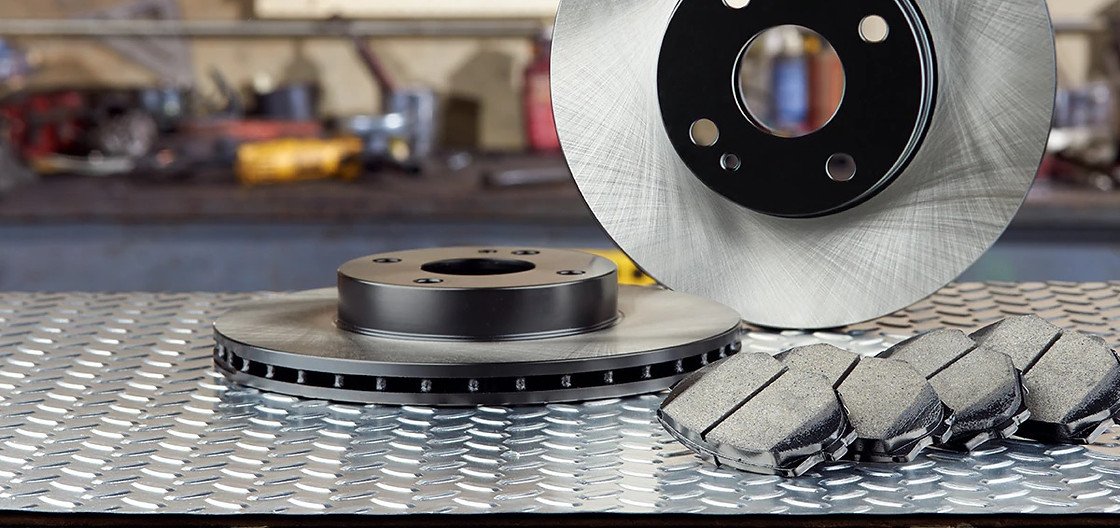- Hours Of Operation:Mon-Friday 8am - 6pm
- Towing Service: Open 24/7

You’re driving home after a long day when a faint squeal sneaks in every time you press the brake pedal. It’s subtle, but enough to make you wonder: Is it time to replace my brake pads? If you’ve ever asked yourself, “How long do brake pads last?” you’re not alone. The general answer is somewhere between 30,000 to 70,000 miles, but that’s just a ballpark. In reality, how long they last depends on you, your driving style, where you drive, and only if you stay on top of maintenance. Disc brakes, on the other hand, tend to hold out longer, mostly up to 80,000 miles or more but they aren’t invincible either.
Let’s break it all down in a way that’s actually useful, so you can stop guessing and start driving with confidence.
Before we talk numbers, it helps to understand what we’re actually dealing with. In disc brake systems, the brake pads are the parts that clamp down on the rotors (or discs) when you press the pedal. That clamping motion is what slows your car.
Think of brake pads like pencil erasers. They wear out gradually every time you use them. The rotors? They’re more like the notebook as they can take a lot of friction, but they’ll show wear if you don’t replace the pads in time.
If you’re just learning how things work in a vehicle, especially if you’ve asked yourself which pedal is the brake in an automatic car, it’s always the leftmost pedal for the clutch in manuals (which automatics don’t have), and the brake is the one in the middle or left of the gas pedal in automatics. Always good to know—especially when checking your brake health.
You might’ve heard someone say their brake pads lasted over 60,000 miles, while another replaced theirs in half the time. Here’s why that happens:
It’s not just how far you drive, but how you drive that matters.
Let’s simplify it a bit. Here’s an overview based on how and where you typically drive:
| Driving Style | Brake Pad Lifespan |
| City Driving (Stop & Go) | 20,000 – 35,000 miles |
| Highway Driving | 60,000 – 70,000 miles |
| Balanced Driving | 40,000 – 60,000 miles |
| Aggressive Driving | 15,000 – 25,000 miles |
Disc brakes? Those often last around 80,000 to 120,000 miles, but they need to be inspected alongside the pads.
Good news: you don’t have to be a mechanic to get the most life out of your brakes. A few simple driving habits can make a big difference:
Think of your brakes as your car’s best defense and treat them like it.
Not sure whether your pads are on their last leg? Your car often tells you, that you just have to know what to look (or listen) for:
Some brake pads even come with wear indicators like little metal tabs that squeal when it’s time for a replacement. It’s the car’s way of saying, “Hey, help me out here!”
Now onto the rotors. These sturdy metal discs don’t need changing as often, but they do wear over time mostly if you let your brake pads wear down too far.
Here’s what can reduce their life:
Some rotors can be resurfaced once or twice (a process that smooths them out), but after that, it’s replacement time.
Tip: Every time you replace your brake pads, have a mechanic inspect the rotors. It’s better to catch issues early.
When you take your car in, here’s what your mechanic probably does:
Looking for a car repair near me? Make sure the shop includes brake checks as part of routine inspections.
Want to take a peek yourself? Here’s a basic way to check your brakes without fancy tools:
Also, pay attention to how your brake pedal feels. A spongy or sinking pedal can signal air in the lines or worn components.
Brake pads aren’t something to leave to chance. While they might last up to 70,000 miles or more, there’s no hard rule. How long brake pads last depends heavily on your lifestyle, your car, and your awareness behind the wheel. Disc brakes, though tougher, still need love, and replacing pads before they’re completely gone helps them live longer, too.
Treat your brakes like a vital organ in your vehicle. After all, they’re the thing that stops everything. Literally.
So if you’re hearing weird sounds or it’s been a while since your last checkup, don’t push it off. Better safe than sorry and cheaper than a new set of rotors or worse, an accident.